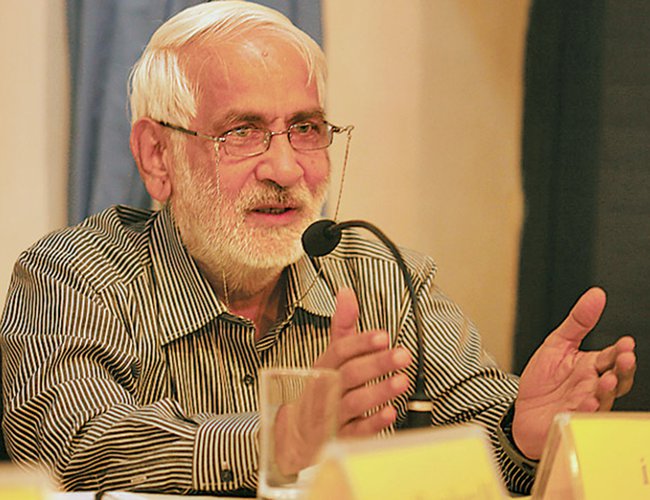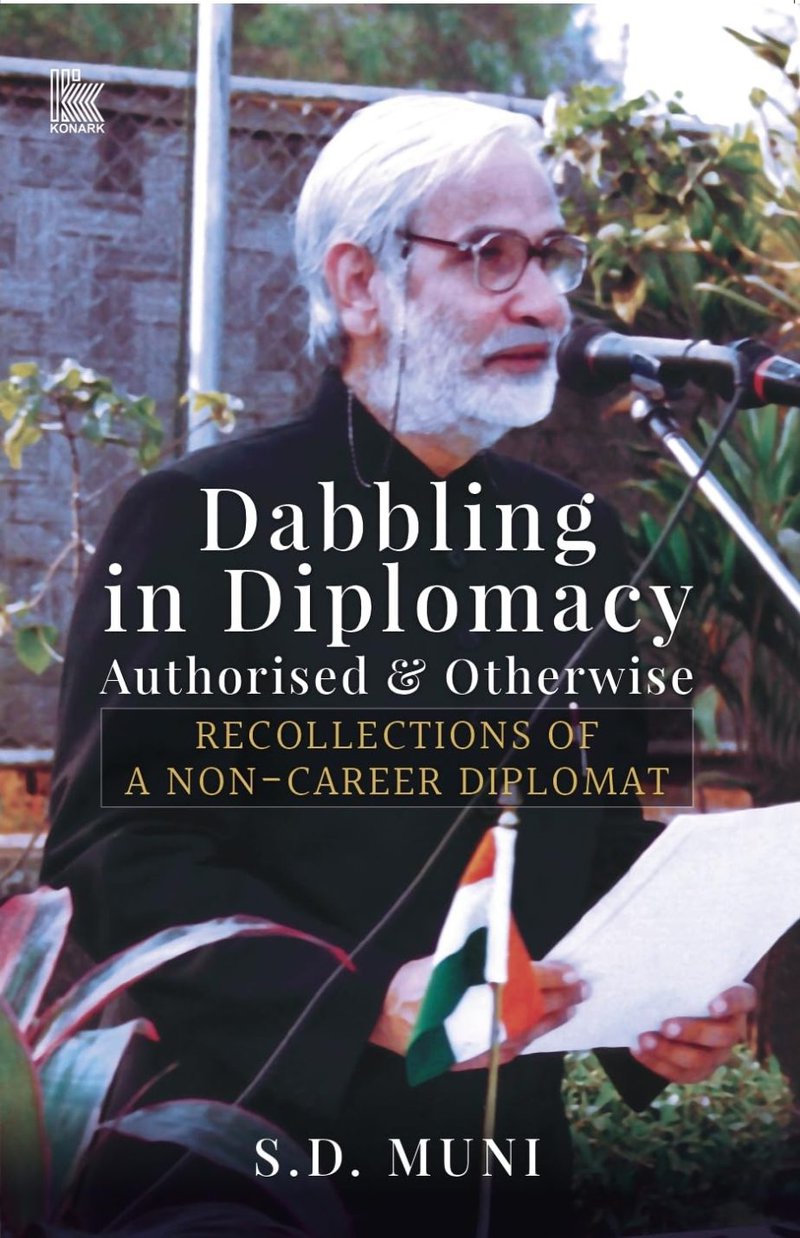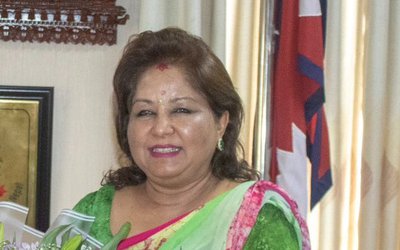
Sukh Dev Muni, a scholar of South Asian studies and professor emeritus at Jawaharlal Nehru University, said that Indian diplomacy is finding it increasingly difficult to deal with turbulent democracy in Nepal.
He said that top Nepali leaders visiting India have been softly persuaded by Bharatiya Janata Party (BJP) ministers and ranking leaders to positively view a Hindu state during informal dinner/coffee chats.
“The BJP and Sangh Parivar activists have been visiting Nepal frequently to interact with the Nepali political class to convey their preference for a Hindu state. Notable in this regard are the frequent visits of the BJP’s foreign policy cell convenor, Vijay Chauthaiwale, to Nepal and his pleas for cultural and civilizational integration between the two countries,” said Muni.
Professor Muni said that Indian diplomacy “thinks that a traditional monarchy may prove to be a deterrent to the expanding Chinese strategic footprint. He said sections of the Indian establishment have been supported that restoration of the monarchy in Nepal.
In his interview with Sudha Ramchandran, South Asia Editor of The Diplomat Online, Professor Muni said how the current regime in India is persuading Nepali politicians across the ideological spectrum to support a Hindu state.
“The Indian establishment appears to be increasingly supportive of the return of the monarchy in Nepal. It “thinks that a traditional monarchy may prove to be a deterrent to the expanding Chinese strategic footprint,” said Muni.
He said argued that this is being done in many subtle ways. Top Nepali leaders visiting India have been softly persuaded by Bharatiya Janata Party (BJP) ministers and ranking leaders to positively view a Hindu state during informal dinner/coffee chats.
In an interview with Sudha Ramachandran, South Asia editor of The Diplomat, Muni draws attention to how the current regime in India is persuading Nepali politicians across the ideological spectrum to support a Hindu state. The Indian establishment appears to be increasingly supportive of the return of the monarchy in Nepal. It “thinks that a traditional monarchy may prove to be a deterrent to the expanding Chinese strategic footprint.”
Excerpts of India
In your book “Dabbling in Diplomacy: Authorised & Otherwise,” you write that the Narendra Modi government’s displeasure in 2015 with the new Nepali Constitution was over its failure to accommodate not only Madhesi aspirations but also the Indian establishment’s preference for the restoration of the Hindu identity of the Nepali state. Any insights into how the Hindu right wing in India is working towards achieving this ‘preference’ in Nepal?
This is being done in many subtle ways. Top Nepali leaders visiting India have been softly persuaded by Bharatiya Janata Party (BJP) ministers and ranking leaders to positively view a Hindu state during informal dinner/coffee chats. The BJP and Sangh Parivar activists have been visiting Nepal frequently to interact with the Nepali political class to convey their preference for a Hindu state. Notable in this regard are the frequent visits of the BJP’s foreign policy cell convenor, Vijay Chauthaiwale, to Nepal and his pleas for cultural and civilizational integration between the two countries. No wonder, even Nepali Congress leaders like Sher Bahadur Deuba and his wife Arju Rana, who always stood for a secular Nepal, are now talking about a Hindu state. There is a signature campaign within the Nepali Congress in favor of a Hindu State.
Constituencies in support of a Hindu state in Nepal have been carved out even among the Maoists. Maoist leader Pushpa Kamal Dahal aka Prachanda’s visits to temples and adorning of saffron robes during his last state visit to India in 2023 were widely commented upon in this respect. Many of my Nepali friends even suggest that financial support has been coming from India for the massive demonstrations and mobilization in Nepal in support of a Hindu and a monarchical state. The Gorakhnath temple establishment in India’s Gorakhpur has openly propagated for a Hindu and a monarchical state for Nepal. I have quoted in my book a strong monarchist claiming that the Indian establishment considers a Hindu state and a monarchy as the two sides of the same coin.
You rightly point out in your book that the two pillars of India’s Nepal policy i.e. support for its monarchy and democracy are “at cross purposes with each other.” But also, the monarchy has often undermined India’s security interests by cozying up to China. Why then do sections of the Indian establishment support the restoration of monarchy in Nepal?
Traditionally, India has supported the constitutional monarchy in Nepal. Unfortunately, the Nepali monarchy never remained constitutional. It has been assertive and autocratic since 1960. That is why it was incompatible with a parliamentary democracy. It is the assertive and authoritarian monarchy that brought in the United States during the early 1950s, and Pakistan and China after the 1960s to counterbalance India’s presence.

Over the past decade, sections of the Indian establishment have supported the restoration of the monarchy in Nepal because Indian diplomacy is finding it increasingly difficult to deal with a turbulent democracy, characterized by instability and a strong presence of communist forces. A monarchy would constitute only one center of power while democracy has created multiple power centers.
The Indian establishment is also finding it difficult to deal with the growing Chinese presence in Nepal and thinks that a traditional monarchy and Hindu State may prove to be a deterrent to the expanding Chinese strategic footprint. It may also be recalled that the monarchy in Nepal has always been friendly with the BJP regime in India. There have been instances of electoral support coming to India’s BJP leaders in parliamentary elections during the 1970s and 1980s from the Nepalese royalty in Nepal. The Nepali royalty is also closely linked matrimonially with Indian princely families, some of whom have a strong affiliation with the BJP.
- The Sentiment Of Monetary Policy Seems Focused On Increasing Eemand: FNCCI President Chandra Prasad Dhakal
- Jul 26, 2024
- Monetary Policy 081/82 Is Making The Economy More Dynamic: Governor Adhikari
- Jul 26, 2024
- Global IME Bank And Shashila Motors Signed Agreement Regarding Electric Vehicle loan
- Jul 26, 2024
- Lok Bahadur Thapa, permanent representative of the UN in New York, was appointed as the Vice President of ECOSOC
- Jul 26, 2024
- Leeladevi Gadtaula Became The First woman Chief Secretary
- Jul 26, 2024
















